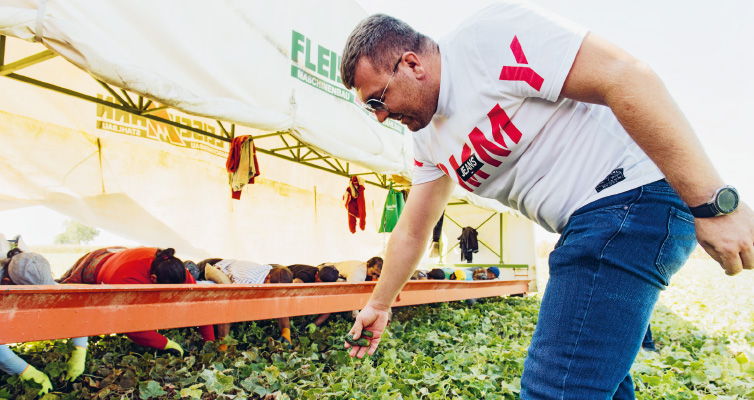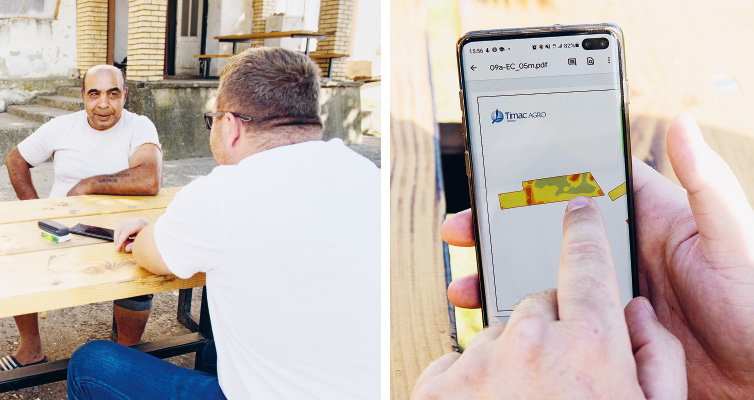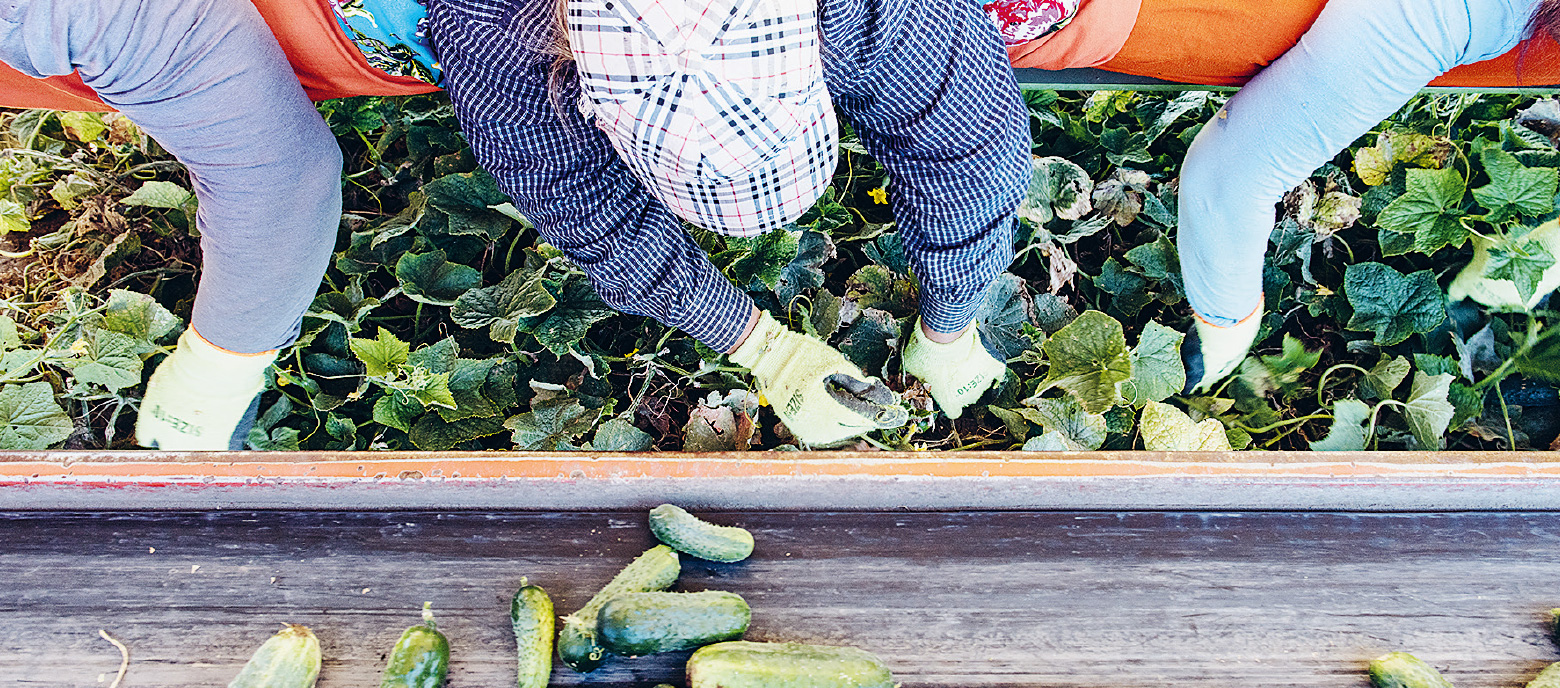Report
Cucumbers wait for no one

Branko Ostić always seems to be pressed for time. The 31-year-old constantly checks his watch and mobile phone, as if he needs to be somewhere soon. Like a rally driver, he steers his car along bumpy country roads surrounded by farmland in the northern Serbian province of Vojvodina.
A conversation at his house in the village of Manđelos, around 75 kilometres north-west of the Serbian capital of Belgrade, reveals just why he is so restless. ‘Cucumbers wait for no one,’ Ostić remarks. He says this sentence over and over again like a mantra, as if it were the philosophy behind the way he runs his business. Cucumbers are by far the Ostić farm’s main product. Ostić sells his entire harvest to a partner in Germany, the Hamburg-based company Kühne, which delivers gherkins all over the world.
In the peak season, he employs more than 150 seasonal workers. On a good day, they harvest up to 40 tonnes of cucumbers from 14 hectares of farmland. One of the workers is Martin Bošković from Vranje in southern Serbia. He has been coming to work for Ostić for the past four years. A member of the Roma community, the 50-year-old chooses to work at the farm because the conditions there are so good and there were no jobs at home. Harvesting cucumbers is hard work, but at least the Ostić farm offers decent housing, he says. And the food is ‘something special’ and, he stresses, free. ‘These kinds of conditions are unusual,’ Bošković notes. On average, seasonal workers in Serbia earn a net daily wage of between EUR 21 and EUR 30. This year, Bošković's wife and son have joined him in working for Ostić. Once the season is over by the end of September, the family will have a good amount of money in their pockets by Serbian standards.
HAPPY WORKERS
A systematic survey of harvesters was performed after the electronic system for seasonal farm workers was launched in Serbia. Two thirds of respondents were pleased with working conditions compared with previous years. Almost half of those surveyed even said that they were very pleased. Better working conditions were mentioned most often as the reason, followed by the fact that they were paid on time and their income had improved. The most frequently mentioned benefit of the new employment system was health insurance in the event of an injury on the job. This benefit was also rated the most important.
The Ostić family-run farm is a popular employer. Seasonal workers travel there from all over the country, from neighbouring Bosnia and Herzegovina and even from Albania. Ostić has built brand-new container housing with air-conditioning. Three times a day, a local restaurant serves meals to the harvesters. During the coronavirus pandemic, all employees undergo COVID-19 testing, sometimes several times. Precautionary and hygiene measures are painstakingly performed. Any new arrivals are housed in separate containers until they have been tested for COVID-19.

Serbian IT companies developed the app
Ostić is the frontman for the family-run farm. Along with cucumbers, the farm also grows tomatoes, tobacco, horseradish, corn and grain. ‘It keeps us busy all year long,’ he says. As he sips on a glass of homemade tomato juice, he explains how his parents lost their jobs at a paper factory and returned to farming, the losers of an economic upheaval that happened in Serbia at the start of the new millennium. He tells the story of how he gave up studying agriculture seven semesters into his university course in Belgrade and joined the family business. He describes how his cautious father tried in vain to squash his son’s ambitions. The farm now has four state-of-the-art tractors with platforms that can fit up to 25 harvest workers at a time, along with a GPS-guided tractor with a sprayer. The farm still has to pay off loans for these purchases. For Ostić, time literally is money.
That’s why the young farmer was glad when the website and Android app to register seasonal workers online were unveiled last year at the town hall in Sremska Mitrovica, the next largest town. GIZ and the National Alliance for Local Economic Development (NALED) in Serbia initiated the project on behalf of BMZ in 2017. Serbian IT firms developed special software for the project, which was then handed over to the Serbian tax authorities.

Quick registration via smartphone
Ostić started using the app straight away. The process of registering workers with the tax authorities is not cumbersome and time-consuming anymore. The app’s launch had huge ramifications for the legal registration of workers. Up until January 2019, around 95 per cent of Serbia’s more than 80,000 seasonal employees worked off the books. Registration numbers soared virtually overnight once there was an easy way to register them online. More than 42,000 seasonal workers employed for a total of 1.2 million working days had been registered by September 2020. Over 440 agricultural enterprises have so far used the website and app, which are connected to the tax office. Serbia now has 97 centres for electrical registration of workers. Farmers can receive advisory services there too. Since the system’s inception, agricultural enterprises have added the equivalent of more than EUR 4 million in taxes and social security contributions to the Serbian budget.
A MODEL FOR THE REGION
Serbia is pursuing reforms that should make it easier for the country to join the European Union in the future. A transparent, legal labour market with social standards is one such element. It strengthens workers’ rights while also generating tax revenue for the state which can then be invested in better services for citizens. The electronic registration system for seasonal workers is one example of how this can succeed. Funded by BMZ, the GIZ Open Regional Fund for South-East Europe – Modernisation of Municipal Services supported the development of this digital tool. This simple method of registering workers creates an employment contract that makes sure employers are on the right side of the law. Employees are automatically entitled to social security for each day that they are registered, as well as a minimum wage and other legal standards. The platform can also be used to share job offers and requests.
Following a successful roll-out in Serbia, other South-East European countries are interested in the system too, especially Montenegro, North Macedonia and Albania. At the same time, its use in other sectors is also being explored. Facilitating access to work while also safeguarding tax revenue is especially vital in tough economic times, like those connected with the coronavirus pandemic.
Contact for the Open Regional Fund for South-East Europe:
Peter Wolf, peter.wolf@giz.deContact for the Serbian e-system:
Amira Omanovic, amira.omanovic@giz.de
Workers also benefit from being registered. By working legally, they are entitled to a guaranteed minimum wage and local health insurance. The employer pays their social security contributions. ‘Making employees happy benefits everyone. I learned that in Germany. Instead of going on holiday, I visited German farming companies,’ adds Ostić.
The farmer is already on the go again. ‘Cucumbers grow three or four times faster in Serbia than in Germany, and are some of the best in the world,’ Ostić explains. He would lose a lot of money if the harvest were delayed because of a technical glitch, a shortage of workers or other delays because ‘it’s the small things that matter most.’ Why did he choose to grow cucumbers? Because it’s the only legal way for a Serbian farmer to make good money, he says with a smile.
published akzente 3/20
